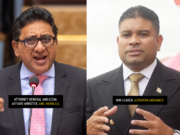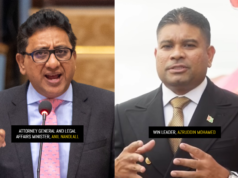Dear Editor,
In my ongoing introspection of operations at the Guyana Elections Commission (GECOM) it has become most obvious that this body is neither progressive nor proactive in managing elections. It may, in fact, be consciously regressive. It has acted jointly with the government-nominated Commissioners and the Chair to hinder many efforts—such as the introduction of biometrics and the removal of deceased persons from the voter list—aimed at enhancing the electoral process.
My belated realization is that GECOM has not taken action to enable workers on oil rigs to vote by proxy, as is provided for transport and harbour workers, or by postal ballot, as is available for the joint services and non-resident Guyanese. When approached on this matter, GECOM simply reiterated that there is no specific provision for rig workers, other than the employer’s obligation to give them time off to vote.
Although the law was passed allowing transport and harbour workers to vote by proxy—at a time when the oil industry did not exist—current circumstances for rig workers are even more dire than those that mandated special arrangements for transport and harbor workers. Their numbers are greater, and the logistics of granting time off pose a significant operational challenge. A more progressive GECOM could have initiated the amendment of the relevant legislation to treat workers on offshore rigs, over 200 miles away, in the same manner as discipline service or transport and harbor workers. Yet, GECOM has repeatedly insisted that initiating legislation is not its responsibility. This insistence flies in the face of GECOM’s constitutional responsibilities and the legislative provisions that empower it to address such difficulties.
I admit I have not raised this issue earlier. However, the reality is that GECOM has been confronted with the problem and has not considered solutions within its reach. Similar to the disenfranchisement of incarcerated individuals, this matter seems of little concern to GECOM. Conversely, the potential disenfranchisement of overseas Guyanese—who are listed, possibly deceased, or not in the country on Election Day—is of major concern. They are known to have voted in 2020, and the provisions designed to ensure they cannot do so threaten their voting rights.
Yours respectfully,
Vincent Alexander
GECOM Commissioner













